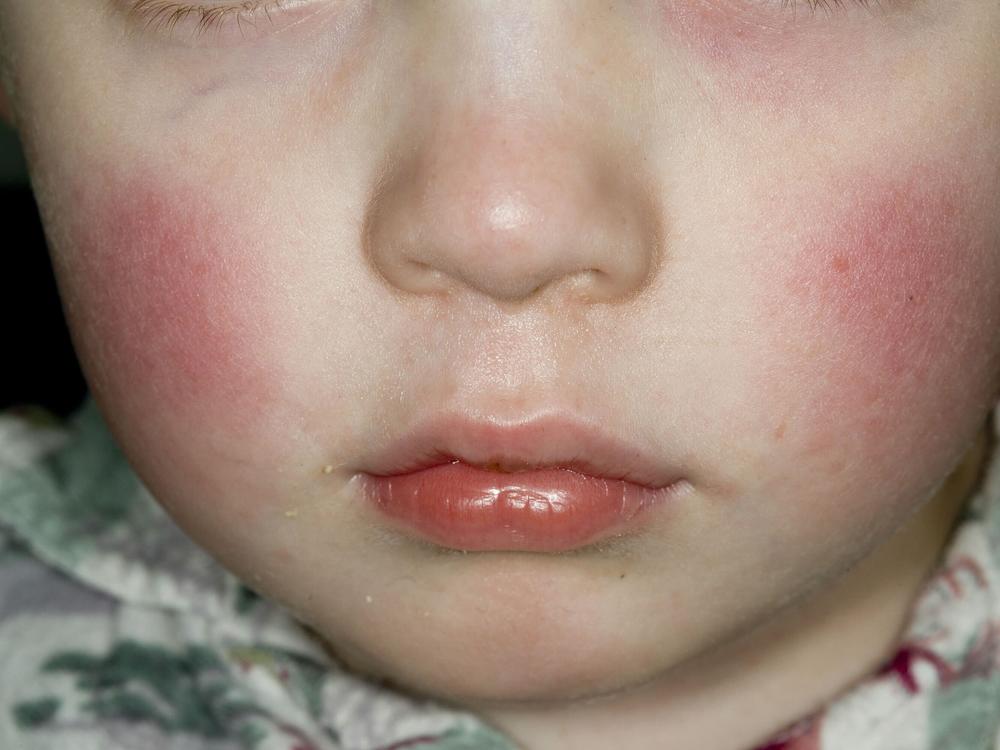Section Branding
Header Content
What to know about the 'slapped cheek' virus uptick in the U.S.
Primary Content
Federal health officials are warning doctors to keep watch for a respiratory virus, known as parvovirus B19, as infection rates tick up in the United States.
Parvovirus B19 has existed for decades, and its symptoms are typically mild or nonexistent among children and healthy adults. But it can also lead to serious complications for people who are pregnant or immunocompromised or who have certain blood disorders.
In a health advisory issued this week, the Centers for Disease Control and Prevention reported seeing a spike in the proportion of people who tested positive for antibodies — indicating a recent infection — especially among children ages 5 to 9.
This year, public health authorities in 14 European countries also reported observing an unusually high number of cases, according to the CDC.
Infections generally pop up during late winter, spring and early summer, while minor outbreaks appear every three to four years. This year, the infection is spreading as back to school gets underway.
Here's what to know about the virus.
How does it spread, and how do I know if I'm infected?
Parvovirus B19 spreads from person to person three ways: respiratory droplets, blood or during pregnancy from mother to fetus. (Canine parvovirus, which affects dogs, is different from parvovirus B19, and it cannot pass from pet to person or vice versa.)
Most people who are infected with parvovirus B19 are asymptomatic. For those who do show symptoms, they can vary depending on age.
In children, the illness can first cause flu-like symptoms, including fever, headache and cough. That's when children are the most contagious, and this typically lasts several days, according to the CDC. Afterward, children may develop a facial rash — which is why the disease caused by the virus is sometimes called "slapped-cheek disease."
Meanwhile, in adults, the most common symptom is joint pain, which could last days to weeks.
How worried should I be?
Most people recover from the illness on their own, without treatment. The risk is when parvovirus B19 affects the bloodstream and leads to complications like a severe drop in blood count.
A parvovirus B19 infection usually doesn't impact a person's pregnancy or their fetus. But in rare cases, an infection may lead to fetal anemia or a miscarriage.
It can be especially dangerous for fetuses before 20 weeks, but it can be treated if it is detected early enough, according to Katherine Bligard, a Washington University OB-GYN at Barnes-Jewish Hospital in St. Louis who has seen a surge in cases in the past few months.
"Luckily, in the cases that I've seen, we have picked up early enough to be able to see the anemia [in the fetus] and treat the anemia with a fetal blood transfusion. All those fetuses are either already delivered or still doing well in their mom's uterus," she said.
An infection can also lead to severe anemia for some people with weakened immune systems, like leukemia patients or organ transplant recipients, or people with certain blood disorders, like sickle cell disease and thalassemia.
Most adults have immune protection. According to the CDC, about 50% of adults have detectable antibodies by age 20 and more than 70% of adults have detectable antibodies by 40.
How do I stay safe?
Like with any respiratory virus, the CDC recommends practicing good hygiene. That means frequent hand-washing and cleaning commonly touched surfaces.
People who are at higher risk should also alert their doctor if they were exposed to a child with a high fever who later developed a facial rash, according to Dr. Kawsar Talaat, an infectious disease expert from Johns Hopkins Bloomberg School of Public Health.
"The important thing is not to panic. This is something that most of us catch without any problems," Talaat said. "This is just a heads-up to give health care providers notice that they're seeing more infection this summer and to be aware of those who are at higher risk."
NPR's Pien Huang contributed reporting.

